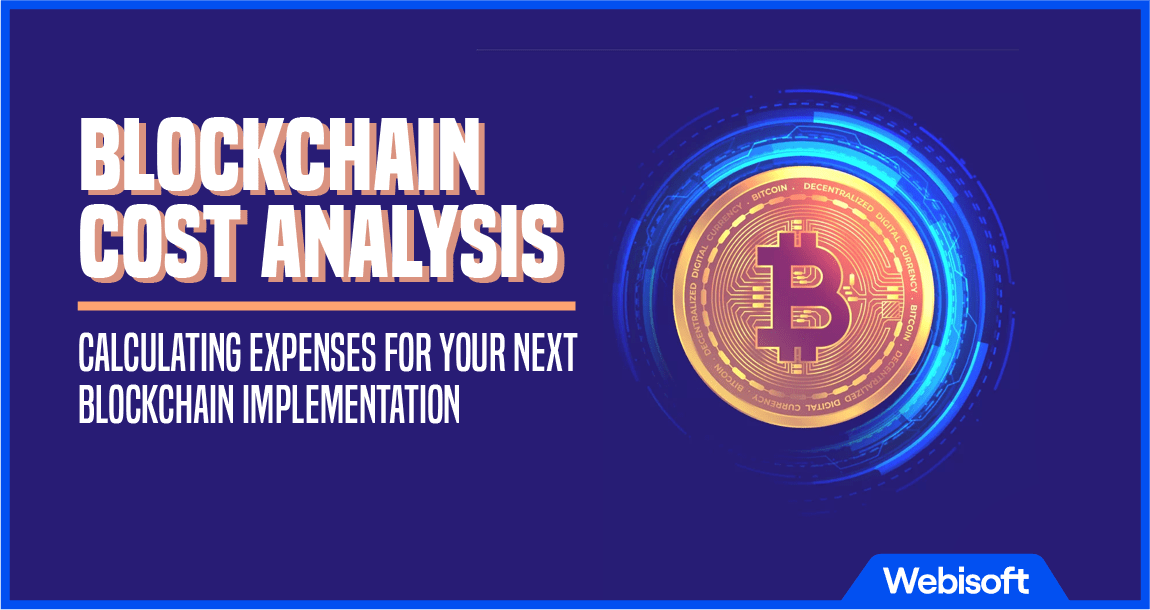Are you ready to dive into the exciting world of the decentralized internet? It’s the dawn of Web 3.0, where technology wizards and internet visionaries are coming together to weave a web of connectivity, transparency, and limitless potential.
And at the heart of this groundbreaking movement lies Blockchain, a technology that reaches far beyond cryptocurrencies and is poised to revolutionize the enterprise mobility industry.
Believe it or not, the faith in Blockchain’s future is strong among technology enthusiasts. According to the latest data from Fortunly, 74% of these forward-thinking individuals recognize Blockchain’s immense potential.
Picture this: from futuristic NFT marketplaces that redefine the concept of digital ownership to cutting-edge cryptocurrency exchange apps facilitating secure and decentralized transactions, Blockchain is the underlying force that powers these groundbreaking decentralized applications.
Now, we know what you’re wondering: “What does it take to develop a Blockchain app? How much will it cost?” Fear not! We’re here to guide you through the maze of estimation and cost factors.
In this blog post, we’ll shed light on everything you need to know about Blockchain app development costs. By the end, you’ll have a clear understanding of the investment required to bring your visionary Blockchain-powered app to life.
Contents
- 1 Industries that Can Benefit from Blockchain Mobile App Development
- 2 Cost of Blockchain Implementation: Process
- 3 Blockchain Development Cost Based On App Types
- 4 Cost of Blockchain Implementation: Complexity of a Blockchain App
- 5 Cost of Blockchain Implementation: Development Resources
- 6 In-House vs Freelancer vs Agency: Whom Should You Prefer?
- 7 Frequently Asked Questions about Blockchain App Development
- 7.1 How long does it take to complete a Blockchain app development project?
- 7.2 How much does it cost to develop a DApp based on the Ethereum Blockchain?
- 7.3 How much does it cost to create a Polygon-based NFT marketplace?
- 7.4 Can you help me estimate the cost of developing my Blockchain app?
- 7.5 How much does it cost to create a cryptocurrency?
- 7.6 How long does it take to develop the blockchain network for a new cryptocurrency?
- 8 Conclusion
Industries that Can Benefit from Blockchain Mobile App Development
Blockchain mobile app development holds tremendous potential for various industries, revolutionizing the way they operate and bringing about significant benefits. Let’s explore some key industries and the specific advantages they can gain from harnessing the power of blockchain technology.
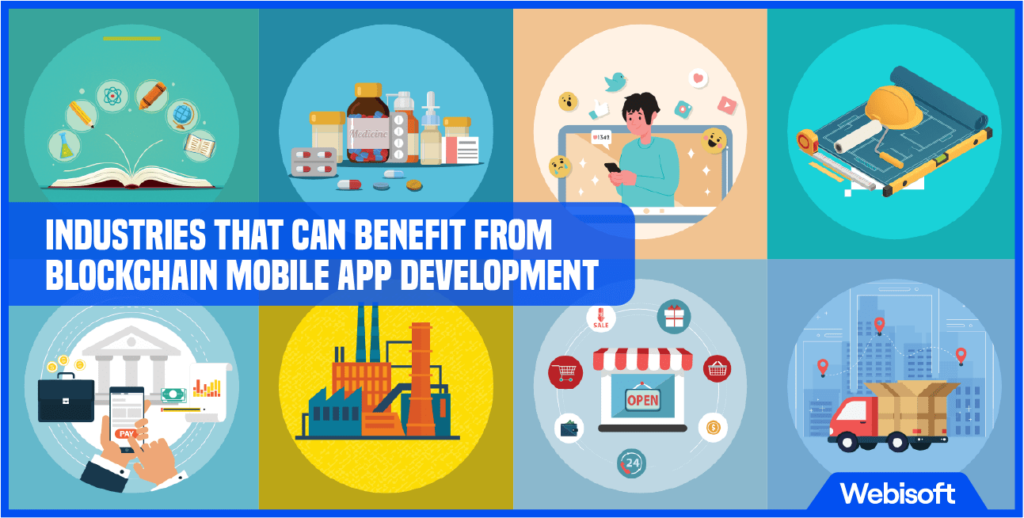
Industry: Real Estate
- Real Estate Sales: Blockchain can streamline the process of buying and selling properties, reducing paperwork and increasing transparency.
- Tokenization: Through blockchain, real estate assets can be tokenized, enabling fractional ownership and opening up new investment opportunities.
Industry: Energy Sector
- Reduction in operational and infrastructure costs: Blockchain can optimize energy distribution, automate billing, and enable peer-to-peer energy trading, leading to cost savings.
- Environmentally sustainable development: With blockchain-based smart contracts and decentralized energy grids, renewable energy sources can be integrated more efficiently, promoting sustainable development.
Industry: Finance Sector
- Digital security: Blockchain enhances security by encrypting and validating financial transactions, protecting sensitive data, and reducing the risk of fraud.
- Flexibility to customize: Blockchain allows for the creation of smart contracts and decentralized finance (DeFi) applications, offering customizable financial solutions tailored to individual needs.
- Error-free transactions: By eliminating intermediaries and automating processes, blockchain ensures accurate and transparent financial transactions.
- Identity management: Blockchain-based identity solutions provide secure and verifiable identity verification, preventing identity theft and enabling trusted digital interactions.
Industry: Logistics Sector
- Efficient V2V communication: Blockchain facilitates direct communication between vehicles, enhancing efficiency, reducing delays, and improving overall logistics operations.
- Easy carrier onboarding: By utilizing blockchain, the onboarding process for carriers can be simplified, ensuring transparent and trustworthy collaborations.
- Reliable authentication: Blockchain-based digital certificates can verify the authenticity of goods and streamline customs processes.
- Easy tracking: With blockchain’s immutable record-keeping, supply chains can be traced in real-time, enhancing transparency and reducing counterfeit goods.
Industry: Healthcare Sector
- Effective in clinical trials: Blockchain can securely store and share clinical trial data, enabling efficient collaboration, ensuring data integrity, and accelerating medical research.
- Easy drug tracing: Blockchain provides a transparent and immutable record of the pharmaceutical supply chain, reducing the risk of counterfeit drugs and enhancing patient safety.
- Data privacy: Blockchain enables patients to have control over their health data, ensuring privacy and secure sharing of medical records.
It’s important to note that the benefits of blockchain app development extend beyond these industries. Other sectors like media and entertainment, insurance, travel, education, and IoT can also leverage blockchain technology to drive innovation and transformation. The possibilities are vast, and with the right implementation, blockchain can revolutionize various aspects of our lives.
Cost of Blockchain Implementation: Process
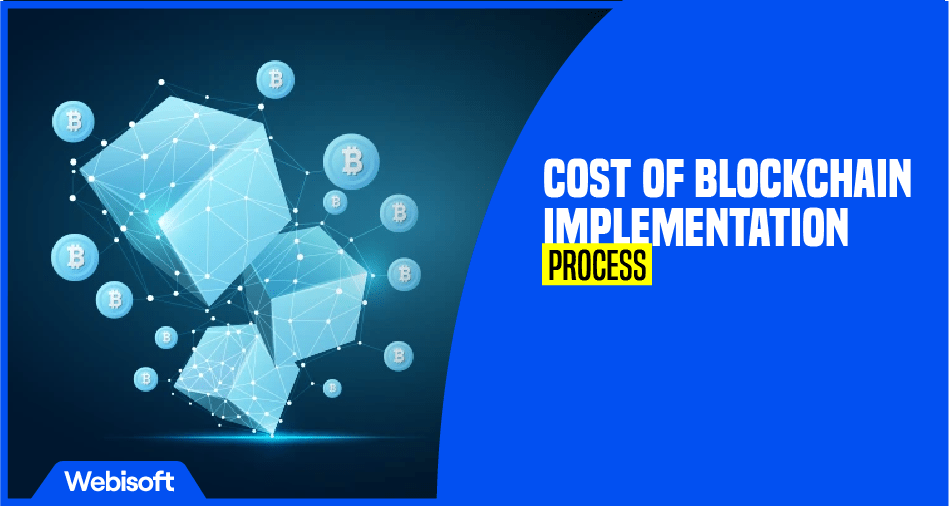
Here is a breakdown of the cost distribution for implementing a blockchain project:
| Milestone | Cost Percentage |
| Consulting | 10% |
| Designing | 15% |
| Development | 50% |
| Quality Assurance | 25% |
| Deployment and 3rd party | Costs (Private Blockchain): ~$1500/monthCosts (Public Blockchain): $0.01/transaction + ~$750 for 3rd party |
| Maintenance Cost | ~15-25% of overall project cost |
Let’s dive deeper into the various aspects of the cost breakdown for implementing a blockchain project:
Consulting
This phase involves seeking professional guidance and expertise to understand the project requirements, identify the best blockchain solutions, and devise a strategic plan for implementation. Consultants can provide valuable insights and recommendations to ensure a successful project.
Designing
Designing encompasses the creation of a user-friendly and visually appealing interface for the blockchain application.
It includes wireframing, prototyping, and developing high-fidelity designs that align with the project’s objectives. This stage aims to enhance user experience and streamline user interactions.
Development
The development phase entails coding and testing the blockchain application.
Skilled developers write the necessary code to build the desired features and functionalities, ensuring that the application operates smoothly and securely. This phase consumes the majority of the project’s budget.
Quality Assurance
Quality assurance is vital to ensure the reliability and robustness of the blockchain application. It involves rigorous testing, including functional testing, performance testing, security testing, and user acceptance testing.
This phase helps identify and rectify any bugs or issues, ensuring a high-quality end product.
Deployment and 3rd Party Costs
Private Blockchain:
Private blockchains require infrastructure setup and maintenance costs. This may involve hosting on cloud platforms, setting up dedicated servers, and other related expenses. The approximate cost for a private blockchain is around $1500 per month.
Public Blockchain:
Deploying an application on a public blockchain incurs transaction fees. These fees can vary depending on the blockchain platform and the complexity of the transactions.
Additionally, there may be costs associated with using third-party services to enhance the application’s functionality, such as APIs or data providers. For a public blockchain, the transaction fee is typically around $0.01 per transaction, and third-party costs can amount to approximately $750.
Maintenance Cost
After the initial development and deployment, ongoing maintenance is essential to keep the blockchain application up to date and running smoothly.
This includes regular updates, bug fixes, security patches, and compatibility testing with new operating system releases.
The maintenance cost typically ranges from 15% to 25% of the overall project cost, depending on the complexity and requirements of the application.
It’s important to note that the cost breakdown may vary depending on factors such as the scope of the project, the complexity of the application, the level of customization required, and the specific blockchain platform being utilized.
The cost of blockchain implementation involves various activities and phases:
- Design: This includes creating the system blueprint, designing the user interface and experience, wireframing, and creating high-fidelity and low-fidelity designs with prototypes.
- Development: It involves coding and testing the blockchain application.
- Deployment: This phase includes deploying the application on cloud platforms, ensuring proper delivery, and implementing DevOps practices.
- Migration: If there is an existing solution that needs to be moved to the blockchain platform, this phase covers the cost of migration.
- Maintenance: This involves maintaining the application, updating it with new features, and testing its compatibility with different operating system releases.
- Upgrade: Incurring costs for implementing new features and making changes to smart contracts.
- Third-Party Tools: Utilizing various tools such as Amazon Web Services for computing, delivery, and storage, bug tracking tools for bug reporting, monitoring services for notifications, notification services for enabling in-app notifications, and analytics tools for data analysis, insights, and reporting.
Apart from these phases, there are additional costs to consider:
- Project Management: The cost of project management tools like Confluence, Trello, and Jira to facilitate agile methodology, conduct meetings, track sprints, and manage deliverables.
- Continuous Integration: Tools like Bitbucket and Github for managing source code and ensuring smooth integration.
- Maintenance: Costs associated with maintaining the blockchain application, switching platforms if required, and keeping up with new operating system updates.
The pricing breakdown may vary depending on the complexity of the application and the specific requirements of the project.
Blockchain Development Cost Based On App Types
Let’s delve into the world of popular Blockchain app types and explore their development costs. Understanding the expenses associated with these applications will provide valuable insights as you plan your Blockchain venture.
Here’s a table summarizing the information provided:
| Blockchain App | Description | Estimated Cost | Time Frame |
| NFT Marketplace | A platform for buying and selling NFTs | $55,000 to $125,000 | 8 to 9 months |
| DApp | A decentralized mobile application | $35,000 to $150,000 | 4 to 8 months |
| Decentralized Autonomous Organization (DAO) | A self-governing entity | $10,000 to $30,000 | 1 to 2 weeks |
| Cryptocurrency Wallet | A mobile app for managing cryptocurrencies | $125,000 to $200,000 | 6 to 9 months |
| Cryptocurrency Exchange | A trading platform for cryptocurrencies | $135,000 to $190,000 | 4 to 5 months |
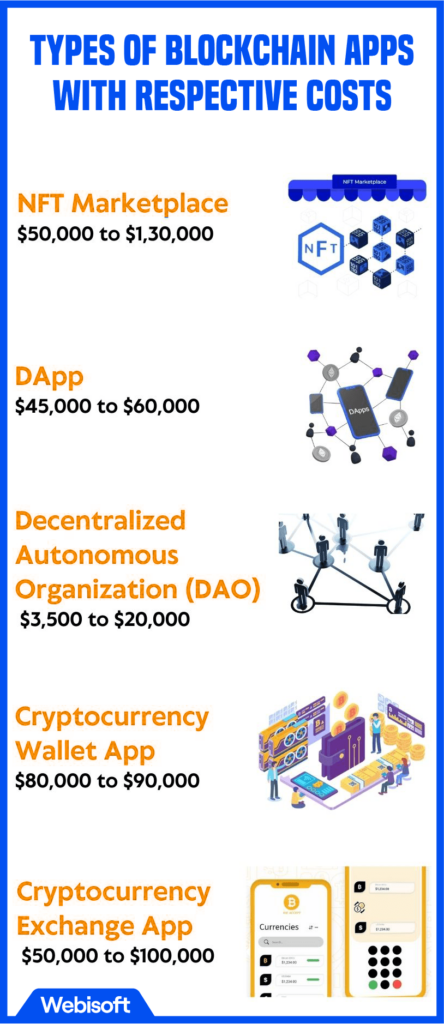
NFT Marketplace
NFTs have captured the attention of business enthusiasts, with major brands like Gucci, Nike, and Facebook diving into this ambitious cryptographic asset.
If you’re considering an NFT marketplace, partnering with an NFT marketplace development company is key.
They will validate your idea, estimate costs, and design and deploy a platform that drives results. Developing an NFT marketplace typically ranges from $50,000 to $130,000.
DApps
Decentralized applications (DApps) leverage Blockchain technology to provide user-oriented functionalities without intermediaries.
To create a successful DApp, collaborating with a DApp development company is recommended.
They will understand your needs and develop a mobile application that delivers desired outcomes. DApp development costs generally range from $45,000 to $60,000.
DAO
Decentralized autonomous organizations (DAOs) operate in a digital and decentralized infrastructure.
Establishing a DAO from scratch involves engaging a DAO agency to guide you through the process. Creating and setting up a DAO can cost between $3,500 to $20,000.
Cryptocurrency Wallet App
Cryptocurrency wallets have become essential tools for managing crypto transactions and data effectively. These wallets allow users to store and transact with a variety of cryptocurrencies.
To develop a dynamic and feature-rich cryptocurrency wallet app, partnering with a cryptocurrency wallet app development company is crucial.
They will assist you in creating an application that efficiently handles crypto transactions. Costs for cryptocurrency wallet app development vary based on project requirements.
Cryptocurrency Exchange App
Cryptocurrency exchange apps are in high demand as they provide a secure and robust infrastructure for trading crypto tokens.
This market is growing rapidly, and turning your crypto plans into a successful exchange app requires the expertise of a cryptocurrency exchange app development company.
The cost of designing, developing, and deploying a cryptocurrency exchange app typically falls between $50,000 to $100,000.
Cost of Blockchain Implementation: Complexity of a Blockchain App
The cost of implementing a Blockchain solution depends on various factors, and one of the key elements is the complexity of your project. Let’s explore the different levels of complexity in Blockchain app development and how they can impact the cost:
| App Complexity | Estimated Cost | Time Frame |
| Low Complex App | $40,000 to $60,000 | 3 to 6 months |
| Moderately Complex App | $60,000 to $150,000 | 6 to 8 months |
| Highly Complex App | $150,000 to $300,000 | 9+ months |
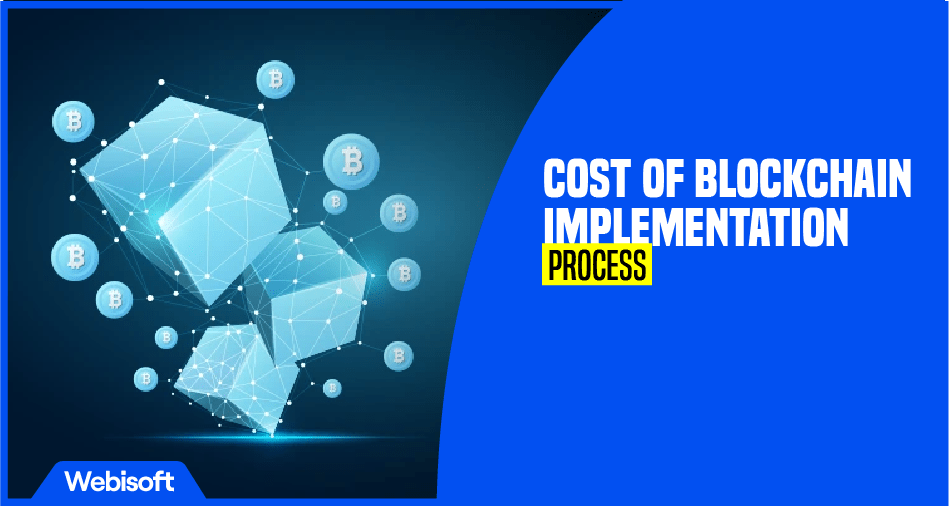
1. Low Complexity Blockchain Apps
These are relatively straightforward applications that serve basic functions. For example, a basic smart contract development app or a payment application built using existing cryptocurrencies would fall under this category.
These apps provide essential functionalities without extensive customization or complex integrations. They are a great starting point for businesses exploring Blockchain technology.
2. Medium Complexity Blockchain Apps
These apps offer more advanced features and require a deeper understanding of Blockchain platforms like Ethereum, Hyperledger Fabric/Sawtooth, EOS, and others.
Semi-decentralized apps and decentralized applications (dApps) built on these platforms are good examples. They provide a higher level of user interaction and often involve integrating with existing systems or databases.
Building such apps requires more expertise and development effort compared to low complexity apps.
3. High complexity Blockchain Apps
These are the most sophisticated and resource-intensive projects. Examples include building a Blockchain platform from scratch, creating a complete decentralized network, or developing unified Blockchain solutions tailored to your specific business needs.
These projects demand extensive research, planning, and technical expertise. They often require a dedicated team of experienced developers and architects to bring them to life.
Cost of Blockchain Implementation: Development Resources
When it comes to building a blockchain app, the number of resources required plays a crucial role in determining the overall cost. Hiring a skilled development team is a significant investment that contributes to the estimated cost.
The salaries of software developers form the primary expense, but it’s important to consider other factors as well, such as benefits, vacations, incentive compensation, payroll taxes, and holidays. These elements add to the overall expenditure associated with building the app.
There are different approaches to consider when it comes to building a blockchain app, each with its own cost implications, benefits, and limitations. Let’s explore a few of them:
Building a blockchain app with an in-house team
This involves assembling a dedicated team of developers within your organization. It allows for greater control and collaboration but requires hiring and managing the team, which can be both time-consuming and expensive.
Hiring freelancers for blockchain app development
This option involves engaging independent developers or small teams on a contract basis. Freelancers offer flexibility and specialized skills for specific project requirements. However, it may require additional effort to coordinate and manage multiple freelancers.
Hiring an agency to build a blockchain app
Working with a development agency can provide a comprehensive solution for your blockchain app needs. Agencies typically have a team of experts across various disciplines and can handle the entire development process. While this option may come with a higher upfront cost, it offers convenience and a streamlined development experience.
It’s important to weigh the pros and cons of each approach and choose the one that best aligns with your project requirements, budget, and timeline.
In-House vs Freelancer vs Agency: Whom Should You Prefer?
When it comes to choosing between an in-house team, freelancers, or an agency for your Blockchain app development, there are several factors to consider. Let’s explore each option in detail and compare them to help you make an informed decision.
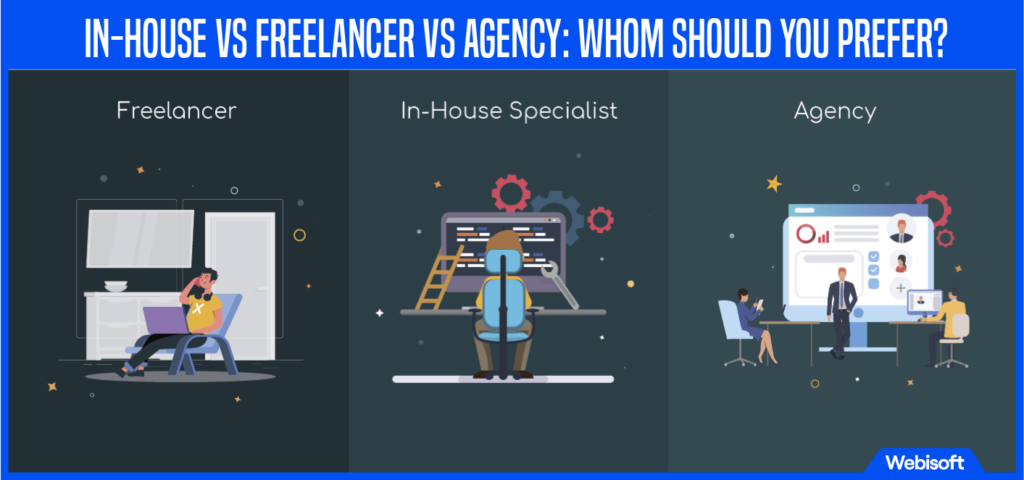
In-House Team
Having an in-house team of Blockchain developers may seem like a good idea at first. You’ll have dedicated resources solely focused on your project, providing you with full control over the development process.
However, it’s essential to consider the bigger picture. Maintaining an in-house team comes with additional costs beyond salaries, such as benefits, vacations, incentives, and workspace expenses. You’ll also bear the responsibility of managing the team and handling any emergencies that may arise.
Furthermore, finding experienced Blockchain developers can be challenging due to the technology’s relatively early stage. The scarcity of talent can drive up the average salary, making it costly for businesses, especially if they’re not specialized in software development.
Overall, working with an in-house team might be suitable for software development companies with the necessary resources and expertise. However, for others, considering alternative options’s often more beneficial.
Freelancers
Hiring freelancers for Blockchain app development can be attractive due to its potential cost-effectiveness. However, there are some considerations to keep in mind.
While freelancers can be less expensive, there can be challenges in terms of their availability, response time, and quality of work. It’s essential to carefully evaluate the freelancers you hire carefully, ensuring they have the necessary skills and experience to meet your project’s requirements.
Freelancers are often a good fit for smaller projects with relatively lower risk factors. However, managing multiple freelancers and ensuring consistent communication and coordination can become more challenging as the project scope grows.
Agency
Working with a specialized Blockchain app development agency is a viable and reliable option. Agencies serve as full-time development service providers and have experience in best practices like DevOps and Agile methodologies.
Compared to an in-house team, agencies offer lower costs for Blockchain app development. They typically sign a contract with you, outlining specific deliverables and timelines, allowing you to understand what to expect clearly.
This enables you to focus more on your core business competencies while relying on their expertise in Blockchain development.
Now, let’s summarize the comparisons in a table format:
| Parameters | In-House Team | Freelancers | Agency |
| Cost | High | Variable | Lower |
| Control | High | Variable | Moderate |
| Availability | Dedicated | Varies | Dependable |
| Expertise | Variable | Varies | Specialized |
| Management | In-house | Individual | Handled by the Agency |
| Scalability | Limited | Limited | Scalable |
| Communication | Seamless | Varies | Professional |
| Risk | Moderate | Higher | Moderate |
Ultimately, the choice depends on your specific project requirements, budget, and business goals. Consider the trade-offs, weigh the pros and cons, and select the option that aligns best with your needs and resources.
Frequently Asked Questions about Blockchain App Development
How long does it take to complete a Blockchain app development project?
The timeline for developing a Blockchain app can vary based on the complexity of the project. The more features and functionalities you want to include, the longer it may take to complete the development.
How much does it cost to develop a DApp based on the Ethereum Blockchain?
The cost of building a DApp on the Ethereum Blockchain can vary depending on the specific requirements and scope of your project. Factors such as the complexity of the DApp, desired features, and development resources needed can all influence the overall cost.
How much does it cost to create a Polygon-based NFT marketplace?
Polygon has gained popularity as a Blockchain platform for NFT marketplace development. The cost of creating a Polygon-based NFT marketplace will depend on various factors such as the desired features, design complexity, and integration requirements.
Can you help me estimate the cost of developing my Blockchain app?
Absolutely! If you have a basic idea or abstract of your Blockchain app, you can reach out to us. Our team of Blockchain experts can provide you with a dedicated cost estimation based on your project requirements. We will work with you to understand your vision and provide an estimate that aligns with your goals.
How much does it cost to create a cryptocurrency?
Creating a cryptocurrency involves various factors, and the cost can vary. On average, you will need around $150,000 to $200,000, excluding marketing expenses.
How long does it take to develop the blockchain network for a new cryptocurrency?
Developing the blockchain network from scratch can take approximately one month. Skilled developers use technologies like C++, Java, Python, or Solidity, and the cost can range from $15,000 to $50,000, depending on technical aspects.
Conclusion
In conclusion, the blockchain cost and implementation depend on various factors such as project complexity and the resources involved.
It’s important to carefully assess your specific requirements and consider options like in-house teams, freelancers, or specialized agencies. Each approach has its advantages and limitations, so choose wisely to ensure a successful Blockchain app development journey.So, ready to embark on your Blockchain journey? Partner with Websioft, your trusted Blockchain development provider. Our experienced team will guide you through the process, delivering cost-effective solutions tailored to your needs. Contact us today to unlock the full potential of Blockchain technology!
